- Last Updated: January 15th, 2026
Key Takeaways
The Instagram Mental Health Lawsuit accuses the platform of having features that harm teens' mental health, leading to issues like anxiety and depression.
Over 40 states have joined together in legal action against Meta Platforms Inc., claiming that Instagram prioritizes profit over the well-being of young users.
Users experiencing mental health problems from using Instagram may seek legal help and file lawsuits if they believe the app has contributed to their condition.
What is Instagram Mental Health Lawsuit?
On this page, we’ll discuss what an Instagram Mental Health Lawsuit is, the mental health effects of Instagram on young users, who qualifies to file an Instagram Mental Health Lawsuit, and much more.
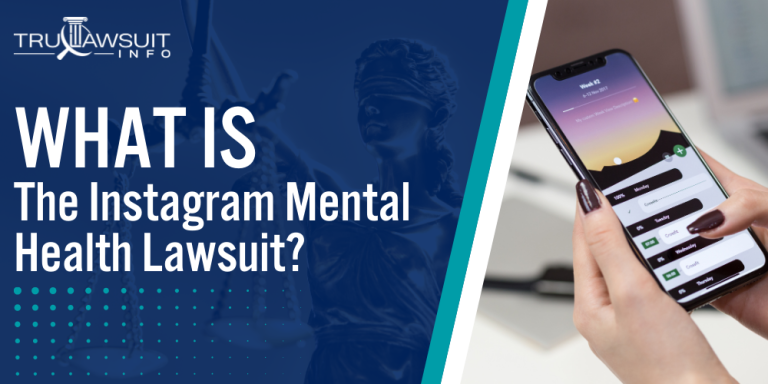
Intro To The Instagram Mental Health Lawsuit
Key points in the Instagram Mental Health Lawsuit include:
- The Lawsuit’s Allegations: States have initiated a personal injury lawsuit against Instagram, accusing it of harming children’s mental well-being.
- Nature of the Case: The litigation claims that Instagram’s design features, such as infinite scrolling and push notifications, are addictive and harm teenagers.
- Litigation Aims: The plaintiffs seek financial compensation, changes to Instagram’s operational practices, and enhanced data privacy enforcement for minors.
- Implications for Social Media Companies: This case emphasizes the need to hold social media platforms accountable for the impact they have on teen mental health.
If you believe your mental health has been adversely affected by Instagram, you may be entitled to pursue compensation.
Contact TruLaw using the chat on this page for an immediate case evaluation to see if you qualify for an Instagram addiction lawsuit.
Impact of Instagram on Mental Health
As legal and public scrutiny intensifies, Instagram’s mental health effects, particularly among teen girls, have become a focal point.
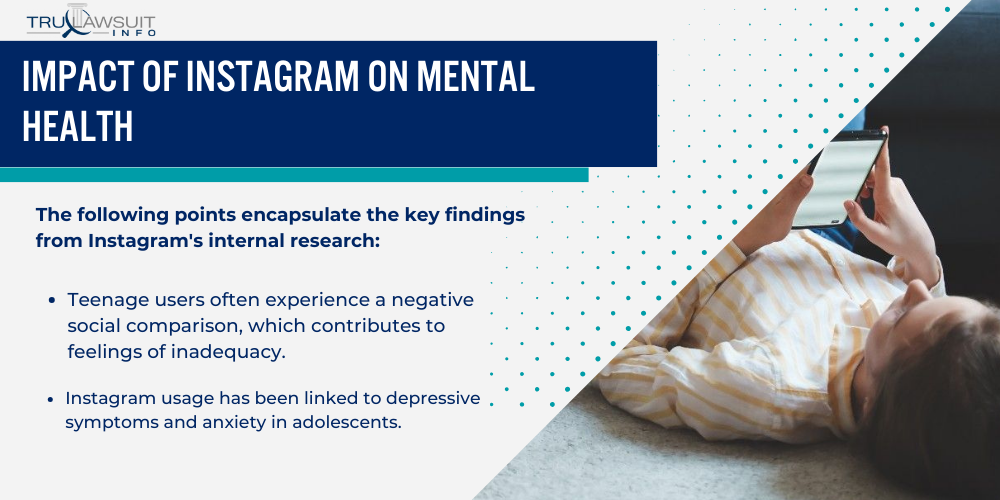
The platform has faced criticism for fostering environments that exacerbate body image issues, depressive symptoms, and low self-esteem.
Internal Research on Mental Health Effects
Instagram has conducted internal research to understand its impact on users’ mental health.
This research came to light, showcasing the associations between Instagram use and various mental health issues.
The following points encapsulate the key findings from Instagram’s internal research:
- Teenage users often experience a negative social comparison, which contributes to feelings of inadequacy.
- Instagram usage has been linked to depressive symptoms and anxiety in adolescents.
- Excessive social media use was found to be correlated with a decline in mental well-being.
- The visual nature of Instagram intensifies body image dissatisfaction, especially among teenage girls.
Instagram and Adolescent Health
The relationship between Instagram and its negative impact on adolescent health has raised red flags among health professionals and advocacy groups, who argue that the platform’s design and algorithms may contribute to other mental health problems.
Considerable aspects of Instagram’s influence on adolescent health include:
- Exposure to unrealistic body standards can lead to severe body image issues.
- A pattern of suffering mental health problems due to negative social comparisons made with peers and celebrities.
- The promotion of a ‘like’ culture may result in low self-esteem when validation is sought but not received.
- Risks of developing eating disorders as a consequence of constant exposure to diet and fitness content.
Psychological Consequences for Teen Users
Instagram‘s platform has been critiqued for its psychological consequences on teen users.
Young users are particularly vulnerable to the negative aspects of social media, which can have lasting impacts on their mental health.
Critical psychological consequences experienced by teen users on Instagram include, but are not limited to:
- Increased feelings of loneliness and isolation stemming from excessive social media use.
- Development of depressive symptoms in teenage users due to constant exposure to peer-curated highlight reels.
- Greater incidence of mental health impacts attributed to cyberbullying and online harassment.
- Struggles with low self-esteem issues fostered by a culture of comparison and competition.
Societal Concerns Over The Instagram Mental Health Lawsuit
The Instagram Mental Health Lawsuit has brought forward substantial societal worries, highlighting the potential impact of social media platforms on young users and the responsibility these companies have in safeguarding mental health.
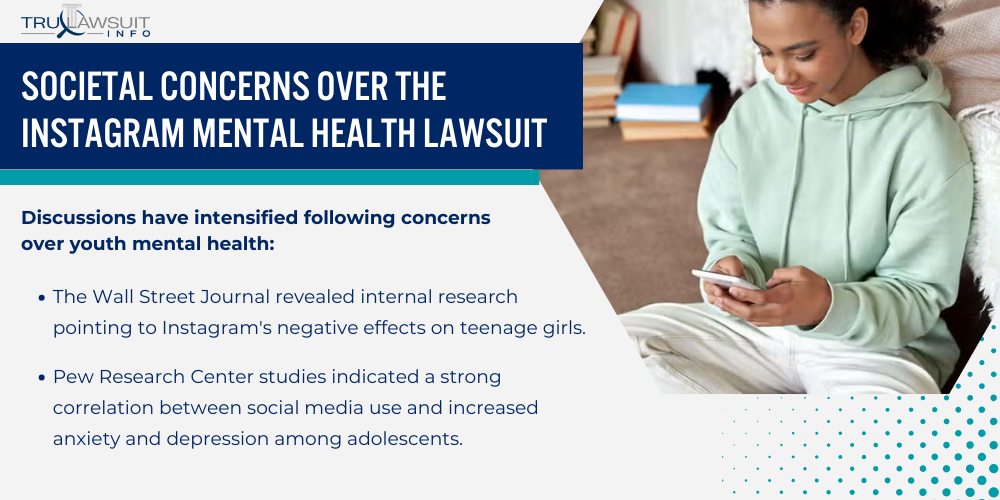
Public Response to Instagram’s Role in Mental Health
The public has voiced significant concern regarding Instagram’s influence on mental health, particularly among young users.
Discussions have intensified following reports:
- The Wall Street Journal revealed internal research pointing to Instagram’s negative effects on teenage girls.
- Pew Research Center studies indicated a strong correlation between social media use and increased anxiety and depression among adolescents.
- Accounts of individuals who attribute their mental health problems to extensive use of Instagram.
- A surge in awareness about online platforms potentially being used to exploit young girls sexually.
Policymaker’s Perspectives on Social Media Responsibility
Policymakers are closely scrutinizing the responsibilities of social media platforms in protecting users’ mental health.
They put forth compelling arguments:
- Many call for stricter regulations to protect children from content that could potentially harm their psychological well-being.
- Discussions around measures to restrict children younger than a certain age from accessing social media have gained traction.
- Legislators are considering imposing penalties on platforms that fail to shield young users from harmful content.
- Proposals to enforce more transparency from social media companies regarding their internal research on user mental health are on the table.
Advocacy Groups and Their Arguments
Advocacy groups are increasingly spotlighting the ethical responsibilities of social media companies, focusing on the well-being of users, particularly children and teens.
These organizations call for a fundamental shift in how platforms like Meta operate, prioritizing mental health and safe online experiences over profit.
Advocacy groups have been vocal about the need for change, uniting around common themes:
- The consensus is that social media platforms should not place profit over the mental health of their users.
- Action plans to enhance young users’ digital literacy to help them healthily navigate social media.
- There is a strong emphasis on creating tools that allow parents to monitor and regulate their children’s social media accounts.
- Campaigns advocating for Meta to acknowledge and address findings that its platform could be particularly damaging to young users.
Instagram Mental Health Lawsuit: Legal Developments
The Instagram Mental Health Lawsuit has seen significant legal progressions, with ramifications impacting the use and regulation of social media.
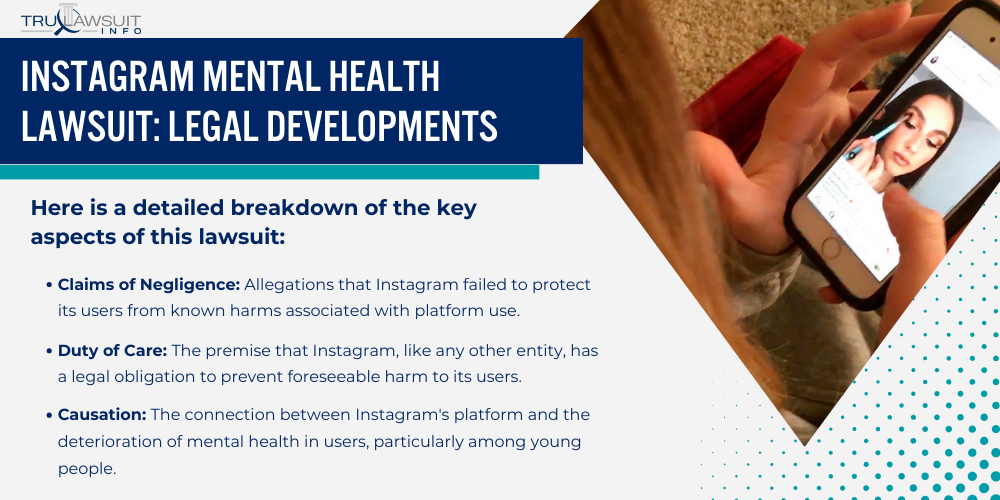
These developments have centered around allegations that the platform’s design and algorithms contribute to mental health issues among its users.
Personal Injury Lawsuit Explained
The personal injury lawsuit refers to the claims brought against Instagram, suggesting that the platform may be culpable in inflicting emotional and psychological harm on individuals.
Here is a detailed breakdown of the key aspects of this lawsuit:
- Claims of Negligence: Allegations that Instagram failed to protect its users from known harms associated with platform use.
- Duty of Care: The premise that Instagram, like any other entity, has a legal obligation to prevent foreseeable harm to its users.
- Causation: The connection between Instagram’s platform and the deterioration of mental health in users, particularly among young people.
- Damages: The measurable impact on individuals’ health and well-being, potentially including depression, anxiety, and body image issues.
Current Status of the Lawsuit
The legal dispute against Instagram’s parent company, Meta, over concerns regarding youth mental health is evolving, with significant developments highlighting its gravity and potential implications.
Key aspects of this lawsuit include a multi-state coalition of attorneys general and ongoing investigations into Instagram’s impact on young users.
To understand where the Instagram mental health case stands as of the latest information, consider the following points:
- Multiple States Involved: Numerous state attorneys general are taking action against Instagram as part of a collective legal effort.
- Ongoing Investigations: Further examination into Instagram’s practices and their harm to youth mental health is being diligently pursued.
- Potential Outcomes: Outcomes may include enforced changes to Instagram’s operational practices, financial restitution, and civil penalties.
- Corporate Response: Instagram’s parent company, Meta, has been prompted to address these serious allegations and may be considering adjustments to its platforms in response.
These stages highlight the lawsuit’s aim to address and remedy the potential harms associated with social media use and set a precedent for digital responsibility.
Instagram's Response and Policy Changes
In the wake of the Instagram Mental Health Lawsuit, Instagram has made official statements and implemented specific policy changes on its platform.
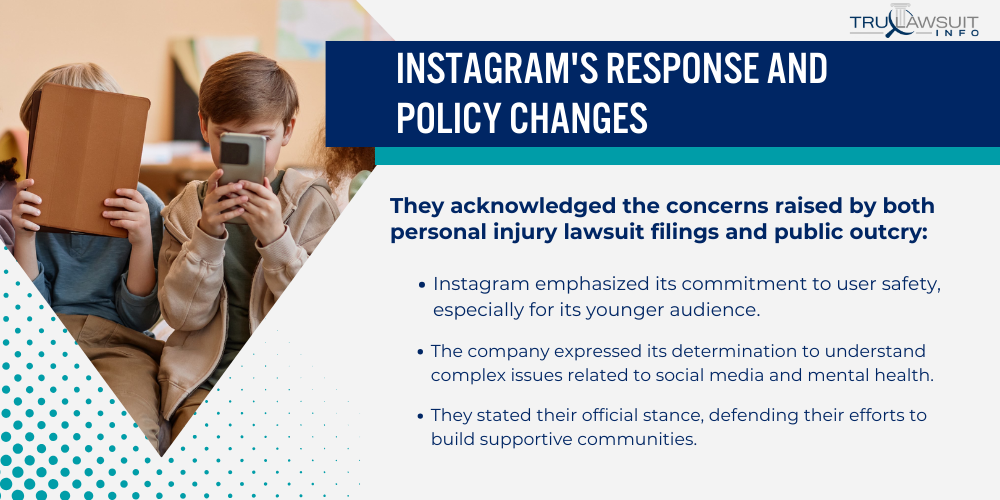
These changes are a direct response to allegations concerning the platform’s impact on users’ mental health, particularly among young audiences.
Official Statements from Instagram
Following the accusations built around internal research presentations that suggested a negative impact on young users, Instagram released formal statements.
They acknowledged the concerns raised by both personal injury lawsuit filings and public outcry:
- Instagram emphasized its commitment to user safety, especially for its younger audience.
- The company expressed its determination to understand complex issues related to social media and mental health.
- They stated their official stance, defending their efforts to build supportive communities.
- Instagram highlighted ongoing efforts to improve transparency regarding internal research.
Changes to Instagram’s Platform
In an effort to address growing concerns about its impact on mental health, Instagram has implemented a series of changes designed to promote user well-being and safety, especially for younger audiences.
These updates include new features for digital wellness, enhanced content moderation, and improved privacy settings for minors.
Instagram announced several changes in response to the backlash:
- The introduction of features to support user well-being, including pause reminders and take-a-break notifications.
- Restricting potentially harmful content and improving content moderation efforts.
- Enhancement of privacy settings, particularly for minors, to increase safety.
- Tools and resources were added to aid users experiencing mental health issues.
These changes represent Instagram’s proactive steps toward addressing the complex relationship between social media platforms and mental health.
Preventative Measures and Responsible Instagram UsagePreventative Measures and Responsible Instagram Usage
As the Instagram Mental Health Lawsuit highlights concerns over mental health problems related to body image issues, it’s important to continue researching how users can maintain a healthy relationship with social media platforms.
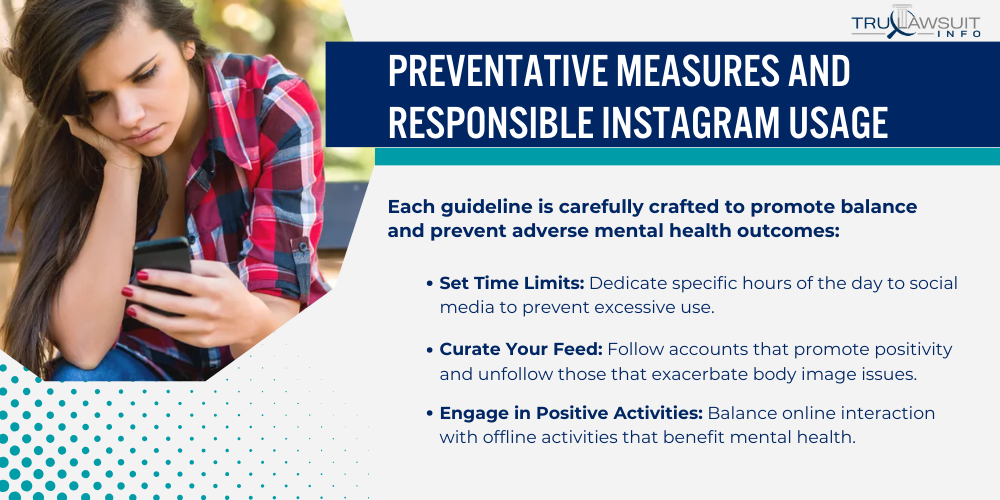
This section covers practical strategies for safe social media use, utilizing tools to protect mental health and the vital role parents play in moderating social media exposure for young users.
Guidelines for Safe Social Media Use
Individuals can follow these strategic tips to foster a healthier online experience and mitigate any potential negative effects of excessive social media use.
Each guideline is carefully crafted to promote balance and prevent adverse mental health outcomes:
- Set Time Limits: Dedicate specific hours of the day to social media to prevent excessive use.
- Curate Your Feed: Follow accounts that promote positivity and unfollow those that exacerbate body image issues.
- Engage in Positive Activities: Balance online interaction with offline activities that benefit mental health.
- Be Mindful of Content: Seek content that encourages self-improvement and learning over material promoting unrealistic body standards.
- Foster Real Connections: Use social media to enhance real-life relationships, not replace them.
- Reflect on Your Feelings: Regularly assess how social media usage impacts your mood and take action when necessary.
Tools for Protecting Mental Health Online
Various tools and features have been developed to protect users’ mental health on platforms like Instagram.
They offer the means to create a safer online environment:
- Usage Trackers: Monitor the time spent on social media and adjust habits accordingly.
- Content Filters: Use built-in features to minimize exposure to harmful content.
- Privacy Settings: Maintain control over who can view and interact with your profile and posts.
- Mental Health Resources: Leverage in-app support and educational resources to address mental health problems.
- Notifications Settings: Limit notifications to decrease the urge to constantly check the app.
- Block/Report Tools: Proactively manage interactions with other users by blocking or reporting inappropriate behavior.
Parents’ Role in Managing Social Media Exposure
Parents are pivotal in guiding their children toward responsible social media usage.
Outlined below are key approaches for parental involvement:
- Open Conversation: Discuss the positive aspects and potential pitfalls of social media together.
- Monitor Activity: Monitor your child’s social media usage to ensure it remains healthy.
- Educate on Social Media Literacy: Teach critical thinking skills to differentiate between realistic and modified images.
- Instill Healthy Habits: Encourage off-screen activities to prevent excessive social media use from becoming problematic.
- Set Boundaries: Establish clear rules regarding time spent on social media platforms.
- Model Behavior: Demonstrate responsible use of social media to lead by example.
Frequently Asked Questions
-
Individuals may qualify for the Instagram Mental Health Lawsuit if they have experienced negative mental health outcomes potentially linked to the use of Instagram.
Documentation of medical treatment or therapy related to these issues may be required to substantiate claims.
-
Numerous states have filed legal actions against Meta, including a coalition led by forty-one states and Washington D.C.
They are seeking accountability for Instagram’s purported negative impact on users, particularly younger demographics.
-
Yes, individuals may have the right to pursue their own legal claims against Instagram.
Such lawsuits typically rely on establishing Instagram’s culpability for the alleged harm inflicted on the individual’s mental health and meeting various legal requirements.
-
The allegations suggest that Instagram has contributed to a mental health crisis, especially among children and teens, through features like “infinite scroll” and constant notifications.
These features are believed to have exacerbated issues such as depression, anxiety, and attention disorders.
-
The settlement terms in the Instagram Mental Health Lawsuit are yet to be finalized and publicly disclosed.
They will likely involve both financial compensations for those affected and potentially enforced changes to Meta’s business practices to prevent future harm.

Attorney Jessie Paluch, founder of TruLawsuit Info, has over 25 years of experience as a personal injury and mass tort attorney, and previously worked as an international tax attorney at Deloitte. Jessie collaborates with attorneys nationwide — enabling her to share reliable, up-to-date legal information with our readers.
Legally Reviewed
This article has been written and reviewed for legal accuracy and clarity by the team of writers and legal experts at TruLawsuit Info and is as accurate as possible. This content should not be taken as legal advice from an attorney. If you would like to learn more about our owner and experienced injury lawyer, Jessie Paluch, you can do so here.
Fact-Checked
TruLawsuit Info does everything possible to make sure the information in this article is up to date and accurate. If you need specific legal advice about your case, contact our team by using the chat on the bottom of this page. This article should not be taken as advice from an attorney.
You can learn more about the Social Media Harm Lawsuit by visiting any of our pages listed below:
Here, at Tru Lawsuit Info, we’re committed to helping victims get the justice they deserve.
To do this, we actively work to connect them with attorneys who are experts in litigating cases similar to theirs.
Table of Contents
Tru Lawsuit Info is a reliable source of information about issues that may affect your health and safety, such as faulty products, data breaches, and environmental hazards.
Our team of experienced writers collaborates with medical professionals, lawyers, and advocates to produce informative articles, guides, and other resources that raise awareness of these topics.
Our thorough research provides consumers with access to reliable information and updates on lawsuits happening around the country. We also can connect consumers with attorneys if they need assistance.
Here, at Tru Lawsuit Info, we’re committed to helping victims get the justice they deserve.
To do this, we actively work to connect them with attorneys who are experts in litigating cases similar to theirs.
